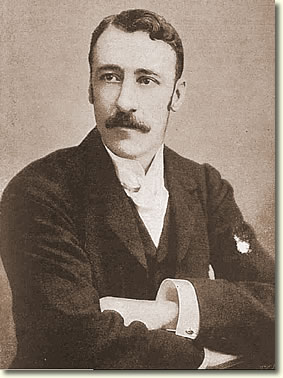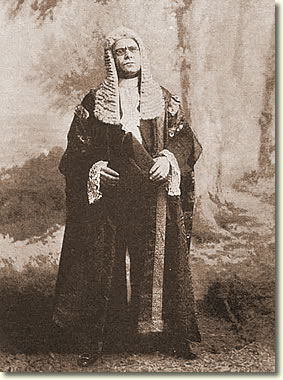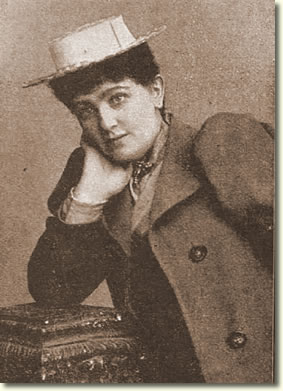 |
 |
||||||
 |
To most people, perhaps, a Savoyard is a latter-day troubadour, who has replaced the guitar of old by the unmelodious accordion or with the impertinent piano-organ. He is usually pictured as a minstrel who wanders over the face of the earth, pitching his tent nowhere for long. That, at any rate, is the characteristic of the Savoyard who hails from the Strand. Mr. D'Oyly Carte's theatre is his home: it is there that he gets his minstrelsy, but he is for ever wandering over the length and breadth of the country, singing his songs and dancing his capers. It may be doubted whether anybody has such a large audience in the provinces as Gilbert and Sullivan. Year in and year out, Mr. Carte's companies are on tour with some of the Savoy operas, and they never fail to get an enthusiastic hearing; indeed, in some towns their visit is one of the great events of the theatrical year, drawing forth scores of people who never darken the doors of a theatre at any other time.
At the present moment no fewer than five companies are playing Savoy opera. One company is in New York, while four minister to the different parts of the United Kingdom. Four of the five are appearing in "Utopia"; the other one, known as C Company, which is under the management of Mr. Robert Redford, travels with a répertoire of the Savoy series.
The other day (writes a representative of The Sketch) I had a chat with Mr. Redford, whose experience gives him authority. Since he first joined Mr. Carte the popularity of Gilbert and Sullivan has enormously increased, becoming little short of a cult. Twelve years ago there was but one company tour, today there are no fewer than five. The four companies in this country are distinguished by the letters B, C, D, and E. There is no A company, probably on the same principle that the evening papers have no first edition. The D company was formed at the time when Mr. Gilbert and Sir Arthur Sullivan ceased to collaborate, and it reproduced in the provinces "The Vicar of Bray" and "Haddon Hall." It is now giving "Utopia" the best towns. The B and E Companies are smaller numerically than C and D, and visit the second-rate towns, although some of the principals in these are singers of very high merit.
 MR. GEORGE THORNE AS THE LORD CHANCELLOR IN "IOLANHE." |
The C (or Répertoire) Company has been playing almost incessantly for fifteen years, one of the principals, Mr. Fred Billington, having been in it all the time, although there have been many other changes. In the earlier days of the company the principals included Mr. Courtice Pounds, Mr. Cadwalladr, Mr. George Marler, Mr. George Temple, Mr. H. d'Egville, Mr. Walker Marnock, Mr. David Fisher (a capital comedian), and the Misses Laura Clements, Alice Barnett, Ethel McAlpine, Ethel Pierson, Haidee Crofton, Rose Hervey, &c. At present it numbers, among others, Mr. George Thorne (a member of the well-known theatrical family of that name), Mr. Billington, Mr. Richard Clarke, Miss Margaret Cockburn, and Miss Dorothy Vane, who played the title-part in "Jane Annie" so charmingly at the Savoy last year. Very few actors are so well known to the provincial as Mr. Thorne, who plays the parts created by Mr. Grossmith. He is exceedingly amusing and one cannot help wondering why he has not been seen at the Savoy. The company is now playing "H.M.S. Pinafore," "Trial by Jury," "Iolanthe," "The Mikado," "The Yeomen of the Guard," "The Gondoliers," "Patience,"and "The Pirates of Penzance." It is an unusually capable combination, giving these operas with quite as much charm as the Savoy company used to do. Indeed, many provincials who have had the opportunity of seeing both prefer the former for all-round excellence and for the admirable way the the members, now thoroughly acclimatised to the peculiar nature of Gilbert and Sullivan humour, work together. This company enjoyed the distinction of appearing a year or two ago at Balmoral before the Queen, who had never before seen "The Mikado," which was played on the occasion.
Mr. Redford has had a varied experience as a manager during the past fifteen years. He began with Miss Geneviè Ward, served under Mr. Lingard, and has for long been with Mr. Carte. It was he who took charge of the company which introduced "Ruddigore" to New York about four years ago. The artists included Miss Geraldine Ulmar, Miss Kate Foster, Mr. George Thorne, Mr. Billington, and Mr. Federici; but the Yankees did not care for the opera, and the company returned to England. Mr. Federici was the actor who met with such a tragic death when playing Mephistopheles in "Faust" in Australia. At the end of one performance, and after he had descended the trap amid red fire, he dropped dead from heart disease. Mr. Redford was also general manager of the royal English Opera House during its lease of life. He is married to Miss Esmé Lee, one of Mr. Carte's principal prima donne.
 MISS MARGARET COCKBURN, PRIMA DONNA "C" COMPANY |
The duties of an acting manager on tour are arduous, involving great responsibility, and above all things, tact and good temper in dealing with all sorts of people. Mr. Redford represents Mr. Carte in every matter when on tour — checking the nightly return of receipts, remitting the cash to head quarters, paying salaries and disbursements and superintending the travelling arrangements. The last duty is no light matter, when it is borne in mind that C and D Companies always travel sixty persons, with ten tons of dresses and properties. The Carte companies always travel by special train. Every Sunday, with rare exceptions, they are on the rails, making journeys, long or short, from one town or city to another. Mr. Redford does his best to make the Sunday journeys agreeable to his large family of artists, and he has introduced a system by which each compartment has at most four occupants, each one having a corner seat. He has thus helped to realise for them that "it's none so bad being out upon the road," as Mr. R. G. Legge has it in his delightful "Songs of a Strolling Player." In the special trains there are three carriages or fifteen compartments, in which the occupants are grouped by their own natural selection. Ladies generally prefer the society of ladies, but not always, and, of course, very many members of the company and chorus are married. If, during a tour, it should happen that an unpleasantness has been created between any two members of a compartment party, Mr. Redford arranges for an exchange of one of the two to another group, and so all goes smoothly. The fares of all the members of the company are always paid by the management, and a contract is made for the tour, coupons being supplied in lieu of tickets.
The great popularity of Sir Gilbert Sullivan's [sic] operas in all parts gives Mr. Carte a great advantage over some less fortunate touring parties, who often have their dates fixed in such a manner that a journey from Newcastle to Cardiff is followed on the next by one on the next back to Leeds or Bradford. Mr. Carte can almost dictate his dates to local managers, and thus the circuit is an easy and natural one, such as Bradford to Liverpool, Liverpool to Manchester, Manchester to Leeds, and so on. The longest journey ever undertaken in Mr. Redford's experience was from Cork to Cardiff, nearly all the way by sea. The Saturday evening performance at Cork had to be abandoned, and the party left Cork at 10.30 a.m. on Saturday morning via Waterford and Milford Haven, arriving in Cardiff about 9.30 a.m. on Sunday morning. Mr. Carte paid for a good breakfast for everybody and for all the meals on the journey, as he always does. Only two or three of all the sixty escape sea-sickness as a rule, and some are "very, very ill" indeed. The "Haddon Hall" Company have now a vivid recollection of a terrible sea voyage from Dublin to Holyhead last November, and thence to Birmingham.They were six hours on the water in a fearful hurricane, and most of them remained on deck, getting drenched to the skin. This experience was followed by a six hours' railway journey in wet garments.
One of the longest land journeys was a recent run from Aberdeen — the Ultima Thule of stagedom in this country — to Leeds. The company started at half-past ten on Sunday morning, reaching Leeds about eleven the same evening. Mr. Redford relates one very unpleasant travelling experience. During the great rivalry between the Caledonian and the North British Railway Companies, some four years ago, the company left Edinburgh one Sunday afternoon, expecting to reach Aberdeen at half-past six in the evening. The Caledonian Company declined to run a special train, so Mr. Redford contracted with the North British, which has only running powers over the last part of the line. All went well until Montrose was reached, when the signals were found to be against the train, and a delay took place. The station was closed, and the station-master could not be found. There was nothing for it but to make arrangements for staying the night at Montrose. It was pitch dark — no lamps being lighted on the Scotch "Sawbath" evening. Some of the ladies began to weep, and everything was looking very black, literally and metaphorically. Mr. Redford and the gentlemen members of the company found their way (by striking matches) to one of the local hotels, but here there was room for only a very few people, though, ultimately, sufficient accommodation was found at other places. There was nothing to eat but a little cold beef and pickles, cooking being apparently tabooed in Montrose on Sunday.
The members of the company generally book their lodgings in each town some weeks, and even months, in advance. The advance agent secures apartments for others, and only rarely is the finding of suitable diggings left until the arrival of the Sunday special. Most lodging- houses — and some are very comfortable — have room for only one or two persons, but that does not matter very much, for actors and actresses are not gregarious in the matter of lodgings, always preferring a place to themselves. The single ladies often travel in pairs, but a leading lady, if unmarried,has her own rooms.
Cricket is cultivated by the gentlemen members of the companies, the C and D Companies especially having good teams. Altogether the Savoyards on tour are what Mr. Legge would call "a jolly crowd."
Page modified 13 April 2021